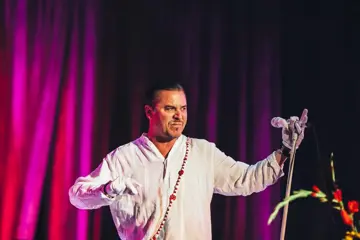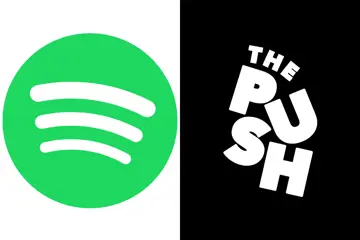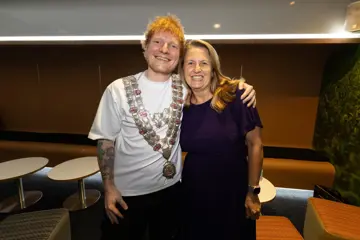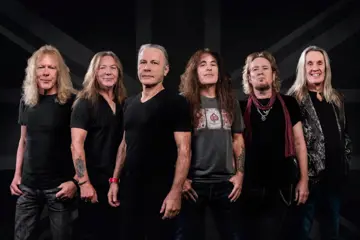Sean Pollard, lyricist, vocalist and guitarist for Split Seconds, has become somewhat of a Perth icon. Over their two-year gestation, the five-piece have become darlings of the touring and festival circuit. Just look at their past achievements: five 2011 WAMi awards, national support duties for The Panics, Jebediah and Owl Eyes, and a whole raft of festival slots including Homebake, Southbound, Pyramid Rock and the Big Day Out. To quote their bio, and depict their nigh-obsessive infatuation with AFL: “If Split Seconds were a football team, their preseason preparation for the 2012 musical year could only be described as impeccable.” On top of this, consistent pub gigging and solo work form Pollard himself lead to what triple j's royal heir Richard Kingsmill described as his favourite Perth band. Funny, then, that Split Seconds haven't been in Perth, but have instead based themselves in that convoluted musical sprawl we know as Melbourne. Mind, just don't assume they don't still call Perth home.
“We've just been working in Richmond, trying to work up a set and get the feel right again,” Pollard explains as I sit down with the affable frontman over a pint, not long after his trip back home. “We haven't played a gig since State Of The Art. It's pretty ironic that the last gig we played is in Perth, and then we relocated to Melbourne, and now the first gig we're playing back is in Perth. We haven't been doing that much because we've been making our way over here. James drove over, so it took him, like, 11 days, and Rhys took a while with work and everything.”
So yes, Split Seconds could, albeit tentatively, be labelled as living out the old trope of relocating over East to fulfil their careers. While it may be unfortunate to see one of Perth's favourite acts pull up stumps, it was an important factor in Pollard and the band's ability to independently produce their debut album, You'll Turn Into Me, and a decision they didn't take lightly. “It's definitely achievable, and we did know it could've been achievable,” Pollard explains. “Because we're an independent band and we don't have too much financial backing from anyone but ourselves, it got a bit harder to make it over all the time. Especially last year, we did, I think, four tours and a couple of festivals.
“A couple of times we just ended up getting stuck in no-man's land. At one point, we got stuck in Melbourne for something like ten days. We were just, like, 'We can't go home because we don't have enough money, so we have to stay here and find accommodation; we can't stay on these people's couches for ten days, there's six of us, including our manager!' We realised that we were just losing so much money on tours and we decided that, by that time the album comes out, if we wanted to tour it properly, we would have to move. So we've moved over now, but we still see ourselves as a Perth band. There's so much of a Perth influence over there anyway. It's not like we've left Perth, it's more that we've just relocated for the sake of making it easier for ourselves. We have no interest in trying to crack the Melbourne scene or anything. There's bands over there that can certainly do that, and we don't want to step on anyone's toes or anything.”
Don't miss a beat with our FREE daily newsletter
The aforementioned debut album bridges the gap between the hard yards the band have put in previously, and where Pollard hopes they will go in the future. It features a mix of songs old and new, many that the band has been playing since the beginning. In a sense, Pollard has been fairly careful with the tracks, slowly shaping them into what he deems complete enough for the album. “It was a pretty gradual thing,“ he tells, “we actually started recording it in about April or March last year. We had a garage where we lived in North Perth in which we were doing all these demos. We couldn't really record drums so we were just using, like, drum machines and just messing around with countless demos. Because we had that time in between sessions to weed songs out that didn't work, we were quite pointed when we went into the studio; we had eleven songs lined up, and we only cut one of them. The tracks we chose came out of really wanting to go with a guitar theme for the record. That was something we really wanted to go for.”
This leads the conversation to something you may have already noticed about Split Seconds before; their penchant for (and aptitude at) big, powerful vocal harmonies. With their bio listing 'vocals' as a role for every member in the band, it seems like an obvious keystone of the band's music to bring up. “It's weird, in every band I've been in and every time I sing, I've always found harmonies to be such a good addition,” Pollard ponders. “You can always make a song a little better with a harmony. You can use them in so many different ways, like call-and-response and so forth. It's just something that I like to do, and I kinda encouraged everyone else in the band to do them. They'd all sung a few harmonies before in other bands and they're pretty adept at it. It's always the last thing we work on, but it always gets to the point where we're like, 'Okay, let's work on our harmonies now'.”
The record itself finds Pollard and the band's usual sound being refined to the effect of a studio album, something which counterparts their already defined live process. Whilst Pollard thrives off of crowds, he says that he is happy with how the album developed, and feels that it is a worthwhile portrayal of the music Split Seconds have been working on for years. In that, one has to account for the huge buzz that hit the band after their WAMi sweep, and the various pressures that come with touring and making a name for yourself nationally. The question naturally arises over whether Pollard ever felt the pressure with so much hype early on in their career. “I was talking to Rhys [Davies, guitar] about this the other day. Now the album's coming out, and with the WAMi's and everything, it never feels like anything's really happening, in a way,” Pollard laughs, before explaining that he's not too cynical about all the publicity. “It all just happens one day at a time. One thing will happen one day, and you'll be like, 'Oh sweet, that rules', but it never feels like you've changed a whole lot. The WAMi's were one thing, because in other bands I'd been nominated for a bunch but had never won before. That really helped with getting a bit of attention over East, and that's one thing the WAMis are great for, with triple j and festivals and everything. That was invaluable, because we really needed that at the time. But still, it doesn't really feel that much different. You still go into a rehearsal room or a studio, and you've still got the same doubts you had before. You still have to work the same way you always have. It doesn't matter whether you're on triple j or you win a WAMi, you're still gonna find yourself in the studio worrying about whether that chorus was any good.
“I mean, it was quite humbling to win so many things and get so much attention so soon. We had all been around the block a few times, so we did all feel prepared, we felt like we had worked hard enough that we'd do well in front of any audience. But yeah, I guess it always feel like the other shoe's gonna drop at some point and someone's gonna go, 'Actually, no, you guys are shit',” Pollard laughs. “But you just learn not to worry about it, I think it's a thing every band goes through. We got all that attention really early on and we were really grateful for that, but we never really saw ourselves as being a buzz band. We don't really think that we have a particularly trendy sound; it's more of a slow-burning and gradual thing, which I think – I hope – shows through the music itself. If you start trying to sound like what's on the radio, or what any other band sounds like, you're in a bit of trouble. We try to avoid that. I feel that we've developed into something that stands out by itself.”















